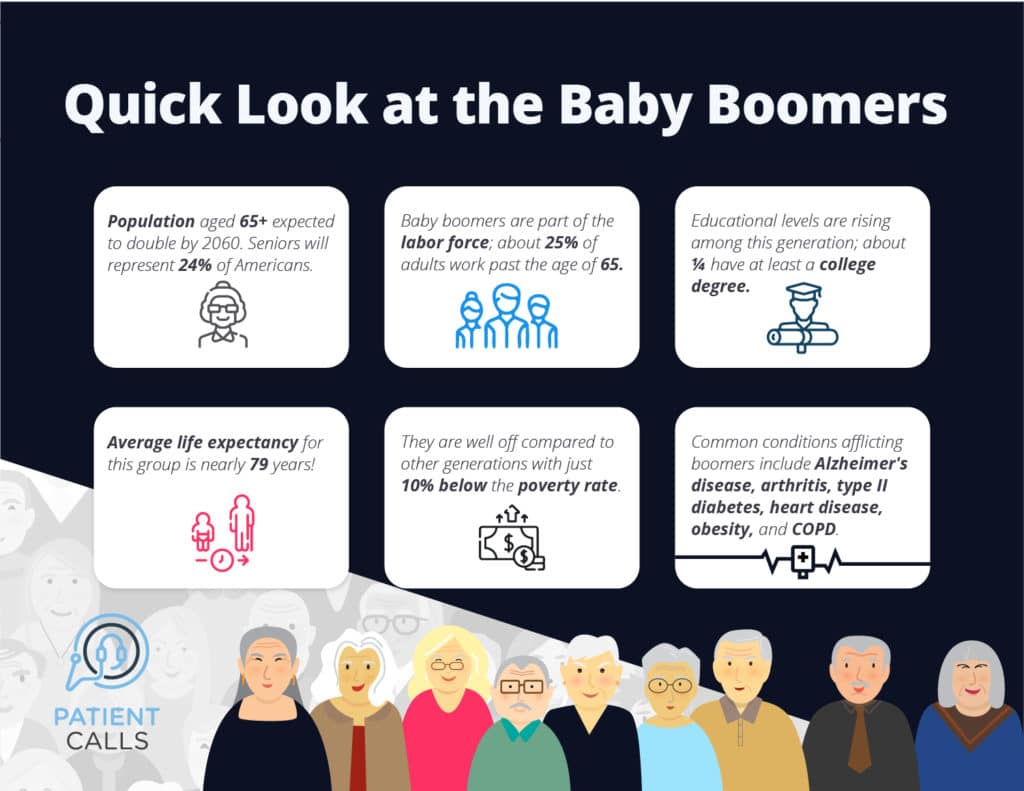
The Baby Boomer Effect on Healthcare: A Comprehensive Analysis
Introduction
The baby boomer generation, born between 1946 and 1964, is the largest generation in American history, numbering approximately 76 million people. As this massive cohort ages, it is having a profound impact on the healthcare system, creating both challenges and opportunities. This article will explore the multifaceted effects of baby boomers on healthcare, examining their unique needs, the challenges they pose to the system, and the potential solutions to address these issues.
Aging and Chronic Conditions
As baby boomers age, they are experiencing an increased prevalence of chronic conditions, such as heart disease, cancer, diabetes, and arthritis. These conditions require ongoing medical care and management, putting a strain on the healthcare system. According to the Centers for Disease Control and Prevention (CDC), 80% of baby boomers have at least one chronic condition, and 50% have two or more.
Increased Healthcare Utilization
The aging baby boomer population is leading to a surge in healthcare utilization. As they experience more health problems, they require more frequent doctor visits, hospitalizations, and prescription medications. This increased demand for healthcare services is straining the capacity of the system, leading to longer wait times, higher costs, and potential shortages of healthcare professionals.
Challenges to the Healthcare System
The baby boomer effect on healthcare poses several challenges to the system:
- Aging Workforce: The healthcare workforce is also aging, and many healthcare professionals are nearing retirement age. This creates a potential shortage of qualified professionals to meet the growing demand for services.
- Limited Resources: The healthcare system is already facing financial constraints, and the increased demand from baby boomers is putting further pressure on resources. This may lead to rationing of care, higher costs, or reduced access to services.
- Changing Needs: Baby boomers have different healthcare needs than previous generations. They are more likely to have multiple chronic conditions and require more complex care. The healthcare system must adapt to meet these evolving needs.
Opportunities for Innovation
Despite the challenges, the baby boomer effect also presents opportunities for innovation in healthcare:
- Telehealth: Telehealth technologies can provide remote access to healthcare services, reducing the need for in-person visits and improving convenience for baby boomers.
- Personalized Medicine: Advances in personalized medicine can tailor treatments to individual genetic profiles, improving outcomes and reducing costs.
- Geriatric Care: The field of geriatric care is growing rapidly to address the unique needs of older adults. This includes specialized training for healthcare professionals and the development of innovative care models.
Potential Solutions
To address the challenges and capitalize on the opportunities presented by the baby boomer effect, several potential solutions have been proposed:
- Increase Healthcare Workforce: The healthcare workforce must be expanded and trained to meet the growing demand for services. This includes recruiting new professionals, retaining experienced ones, and providing ongoing education.
- Invest in Technology: Technology can improve efficiency, reduce costs, and enhance access to healthcare. Investments in telehealth, electronic health records, and other technologies can streamline care and improve outcomes.
- Promote Healthy Aging: Encouraging healthy behaviors, such as exercise, nutrition, and preventive screenings, can help baby boomers maintain their health and reduce the burden on the healthcare system.
- Reform Payment Models: Payment models should be reformed to reward value-based care and incentivize providers to focus on improving outcomes rather than increasing volume.
- Expand Long-Term Care Options: As baby boomers age, they may require long-term care services. Expanding access to affordable and quality long-term care options is crucial to support their needs.
Conclusion
The baby boomer effect on healthcare is a complex and multifaceted issue. As this generation ages, it is creating both challenges and opportunities for the healthcare system. By understanding the unique needs of baby boomers, addressing the challenges they pose, and embracing innovative solutions, we can ensure that they receive the high-quality healthcare they deserve while preserving the sustainability of the system for future generations.
Additional Considerations
- Mental Health: Baby boomers are also facing mental health challenges, such as depression and anxiety. These conditions can impact their overall health and well-being and require appropriate care.
- Social Determinants of Health: Social factors, such as income, education, and access to housing, can significantly impact health outcomes. Addressing these social determinants is essential for improving the health of baby boomers.
- Equity and Inclusion: It is important to ensure that all baby boomers have equitable access to healthcare services, regardless of their race, ethnicity, socioeconomic status, or sexual orientation.
- Intergenerational Collaboration: Collaboration between baby boomers and younger generations can foster innovation and improve healthcare outcomes. By sharing knowledge and perspectives, different generations can work together to create a more sustainable and equitable healthcare system.
